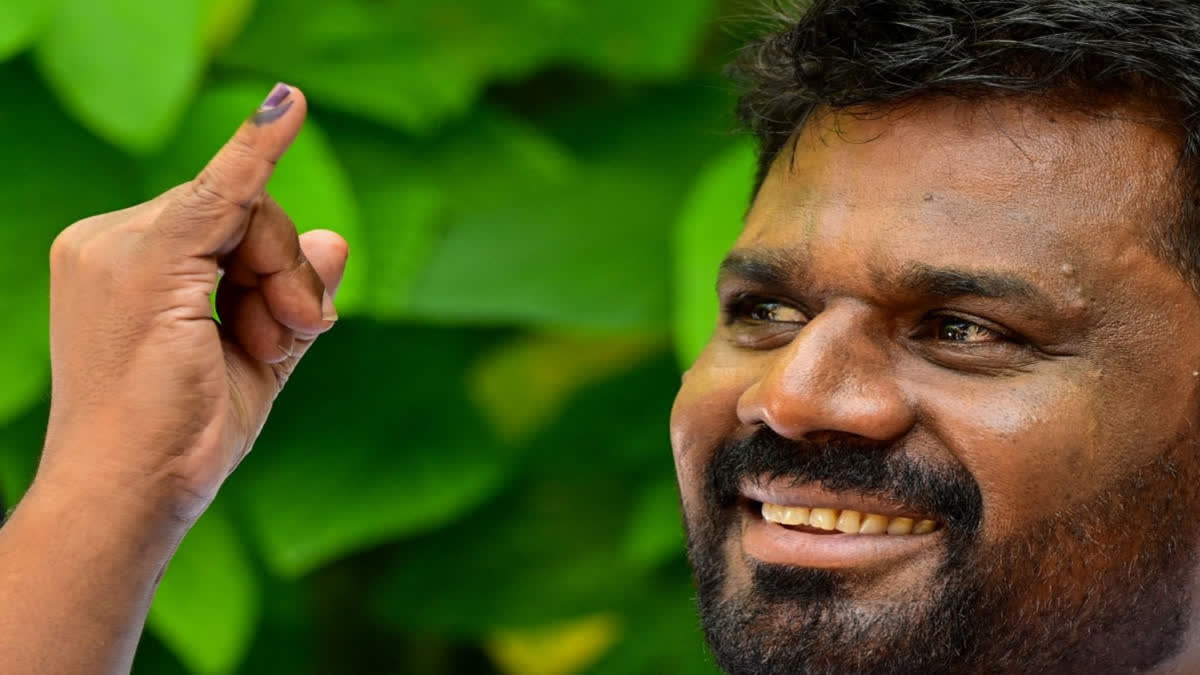Thiruvananthapuram: The election of Anura Kumara Dissanayake as Sri Lanka's new president has surprised many, reshaping the country's political landscape. As former Indian ambassador to the U.S. and foreign affairs expert T.P. Sreenivasan noted in an exclusive interview with ETV Bharat, Dissanayake's victory marks a significant shift in Sri Lankan politics.
The unexpected defeat of former President Ranil Wickremesinghe, who had made substantial efforts to address Sri Lanka’s economic crisis, raises questions about the future trajectory of the country, particularly its relations with major regional powers - India and China.
Sri Lanka has long balanced its ties between these two Asian giants, and Dissanayake's election introduces uncertainty about which direction the country will now lean. Despite Wickremesinghe's success in securing an IMF bailout and negotiating with India to ease the economic strain caused by Chinese debt, he finished third in the polls. Instead, the electorate opted for Dissanayake, a leftist leader with communist roots, signaling a desire for change.
According to Sreenivasan, the election result highlights that Wickremesinghe’s attempts to stabilize the economy did not resonate with the public. His close association with India and the West may have contributed to his lack of support, especially as China’s extensive investments created a debt burden that severely impacted the country. However, Dissanayake’s victory does not necessarily signal a pivot towards China. Despite his left-wing ideology, Dissanayake has already indicated a pragmatic approach to foreign relations.
In his early statements, Dissanayake suggested that Sri Lanka’s ties with both India and China would be reconsidered. He has neither fully embraced China nor distanced himself from India. As Sreenivasan observed, Dissanayake is still adjusting to the enormity of the challenges Sri Lanka faces, having been in office only a short time. His cautious stance so far suggests that he is weighing his options before making any significant policy decisions.
Sreenivasan emphasized that while Dissanayake’s leftist leanings might imply a tilt towards China, it is too early to draw any conclusions. The new president appears to be aiming for a balanced approach, avoiding outright dependency on either India or China. Given Sri Lanka's precarious economic situation, such an approach would allow the country to maximize international support while maintaining sovereignty in its foreign policy decisions.
India’s role remains crucial. Prime Minister Narendra Modi has already extended an olive branch to the new government, signaling India's commitment to regional stability. India’s strategic interests in Sri Lanka, particularly in the Indian Ocean region, remain vital, and any shift towards China will be closely monitored by New Delhi. However, as Sreenivasan points out, Dissanayake’s initial signals suggest that he values strong ties with India.
At the same time, Dissanayake will need to address China's significant economic presence in Sri Lanka. Chinese investments, especially in infrastructure projects, have had a mixed impact—bringing development but also increasing the country’s debt burden. Sreenivasan highlighted that renegotiating these agreements without worsening Sri Lanka’s economic crisis, while simultaneously safeguarding India’s investments, will be one of Dissanayake’s greatest challenges.
Looking ahead, Sreenivasan noted that Dissanayake’s ability to navigate these competing interests will depend largely on the outcome of the upcoming parliamentary elections. Without a parliamentary majority, Dissanayake could face difficulties implementing meaningful reforms, and tensions may arise over investment policies, particularly regarding foreign projects.
Ultimately, Sreenivasan believes Dissanayake will need to perform a delicate balancing act. While his leftist background raises questions about his potential alignment with China, the geopolitical realities of Sri Lanka's situation demand a more nuanced approach. The new president is likely to continue engaging with both India and China, carefully negotiating to secure Sri Lanka’s economic recovery and political stability. As the world watches, particularly India, Dissanayake's next moves will be crucial in determining Sri Lanka's future direction.



